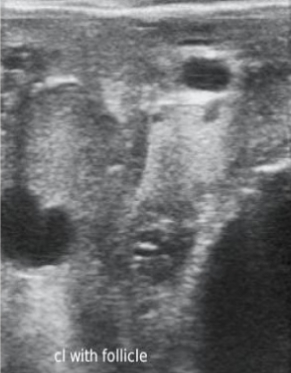A rare occurrence of twin mummification in Murrah buffalo: Case report
DOI:
https://doi.org/10.56825/bufbu.2022.4124510Keywords:
Bubalus bubalis, buffaloes, twin mummification, ultrasonography, PCL, cervical dilationAbstract
Twin mummified fetus is a rare phenomenon diagnosed in the buffalo presented to RVP, IVRI for pregnancy confirmation with the history of six-month gestation, free from any abdominal enlargement as per gestational age. Per rectal examination revealed tumor like hard mass while ultrasonographic picture disclosed hyperechoic fetal skeleton around hypoechoic or anechoic structures in uterus with the active CL on the right ovary. Erstwhile placentomes, foetal fluids and foetal heartbeat was absent. Cervical dilation was achieved through combination of drugs, hot fomentation and manual massage of cervix and fetuses were pulled out after 30 h of induction.
Downloads
Metrics
References
Barth, A.D. 1986. Induced abortion in cattle. p. 205-208. In Morrow, D.A. (edn.) Current Therapy in Theriogenology, 2nd ed. WB Saunders, Philadelphia, USA.
Bisla, A., B. Kumar, R. Kurhe, H. Behera, A.A. Ngou, I. Shah and J.A. Khan. 2018. Dystocia due to fetal mummification in a non-descript goat: A case study. Journal of Experimental Biology and Agricultural Sciences, 6(3): 613-616. DOI: 10.18006/2018.6(3).613.616
Christianson, W.T. 1992. Stillbirths, mummies, abortions, and early embryonic death. Vet. Clin. N. Am.-Food A., 8(3): 623-639. DOI: 10.1016/s0749-0720(15)30708-8
Hailat, N., S. Lafi, F. Al-Ani, A. Al-Darraji and M. Fathalla. 1997. Ovine fetal maceration. Small Animinant Res., 25(1): 89-91. DOI: 10.1016/S0921-4488(96)00956-X
Irons, P.C. 1999. Hysterotomy by a colpotomy approach for treatment of foetal mummification in a cow. J. S. Afr. Vet. Assoc., 70(3): 127-129. DOI: 10.4102/jsava.v70i3.772
Johnston, S.D. and S. Raksil. 1987. Fetal loss in the dog and cat. Vet. Clin. N. Am.-Food A., 17: 535-554. DOI: 10.1016/s0195-5616(87)50052-3
Lefebvre, R.C. 2015. Fetal mummification in the major domestic species: current perspectives on causes and management. Veterinary Medicine: Research and Reports, 6: 233-244. DOI: 10.2147/VMRR.S59520
Mahajan, M. and A. Sharma. 2002. Haematic mummification due to umbilical cord torsion in a cow: A case report. Indian Vet. J., 79(11): 1186-1187.
Mari, G., E. Iacono and C. Castagnetti. 2004. Reduction of twin pregnancy in the mare by transvaginal ultrasound-guided aspiration. Reprod. Domest. Anim., 39: 434-437. DOI: 10.1111/j.1439-0531.2004.00536.x
Meyers, P.J. and D.D. Varner. 1991. Abortion of a mummified fetus associated with short uterine body in a mare. J. Am. Vet. Med. Assoc., 198(10): 1768-1770.
Moore, A.A. and G.F. Richardson. 1995. Uterine torsion and fetal mummification in a cow. Canadian Vet. J., 36: 705-706.
Roberts, S.J. 2004. Diseases and accidents during the gestation period. p. 170-173. Veterinary Obstetric and Genital Diseases, 2nd ed. CBS Publishers and Distributors, New Delhi, India.
Robinson, K.A. and S.T. Manning. 2011. Premature lactation and retention of a mummified fetus with live birth of the Co-twin in a primiparous morgan mare. Can. Vet. J., 52(4): 423-425.
Sandoval-Castillo, J. and C. Villavicencio-Garayzar 2008. Fetal mummification in silky shark (Carcharhinus falciformis) from the gulf of California, Mexico. Braz. Arch. Biol. Techn., 51(3): 551-554. DOI: 10.1590/S1516-89132008000300015
Shah, N., H.P. Yadav, M. Verma, B. Kumar, V. Singh and A. Saxena. 2018. Extraction of the mummified Fetus in indigenous cattle by caesarean section: A case report. J. Exp. Zool., 21(2): 733-735. Available on: https://www.cabdirect.org/cabdirect/FullTextPDF/2018/20183287182.pdf
Stevens, R.W. and G.J. King. 1968. Genetic evidence for a lethal mutation in Holstein-Friesian cattle. J. Hered., 59(6): 366-368. DOI: 10.1093/oxfordjournals.jhered.a107748
Windsor, P. 2018. Abnormalities of Development and Pregnancy. p. In Noakes, D.E., T.J. Parkinson and G.C.W. England (eds.) Arthur’s Veterinary Reproduction and Obstetrics 10th ed. Elsevier, USA.
Yadav, D., B. Kumar, A. Patel, V. Sachan, S. Yadav, A. Kumar, A. Kumar and A. Saxena. 2019. Partial fetal mummification in Murrah buffalo associated with prolong gestation. Buffalo Bull., 38(2): 383-387. Available on: https://kuojs.lib.ku.ac.th/index.php/BufBu/article/view/91/1219









.png)








